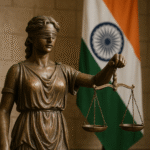New Delhi, 2025 — Politics in India, as in many democracies, is a complex interplay of ideals, ambition, and public service. The question of who should lead and on what grounds is not just a matter of governance but also of deep philosophical importance. In a nation as diverse as India, candidates often face a unique set of challenges that test their resolve, ethics, and endurance. From grassroots struggles to systemic barriers, the journey of political candidacy reflects both the strength and fragility of India’s democratic framework.
The Philosophical Basis of Candidacy
- The Gandhian Vision
- Mahatma Gandhi believed in politics as a means of service rather than a pursuit of power. His philosophy emphasized selflessness, community welfare, and the ethical conduct of leaders.
- Plato’s Philosopher-King
- The idea of leaders being guided by wisdom and virtue resonates with the need for enlightened candidates in India, who can balance personal ambition with public welfare.
- Indian Constitution’s Vision
- The Indian Constitution, inspired by Dr. B.R. Ambedkar, lays down the principles of equality, secularism, and justice, reflecting the philosophical expectation that candidates should serve all citizens without bias.
The Struggles of Political Candidates in India
- Financial Burden
- Contesting elections in India is expensive. A 2024 report by the Association for Democratic Reforms (ADR) revealed that the average cost of running for a Lok Sabha seat exceeded ₹5 crore, making it difficult for candidates without substantial financial backing to compete.
- Grassroots Candidates’ Struggles
- Leaders emerging from grassroots movements often lack the resources and networks necessary to navigate the political landscape. Despite their connection with local communities, they are frequently overshadowed by wealthier or better-connected opponents.
- Gender Bias
- Women candidates face systemic challenges, including societal prejudices and safety concerns. While the Women’s Reservation Bill promises greater representation, many female leaders still face resistance within their parties and constituencies.
- Physical and Emotional Toll
- The rigors of campaigning, coupled with constant public scrutiny, take a significant toll on candidates. Reports of burnout and health issues among candidates have increased, with many citing the pressures of managing public expectations and personal commitments.
- Threats and Violence
- Candidates, particularly those tackling contentious issues like corruption or social justice, often face threats to their safety. According to the National Crime Records Bureau (NCRB), political violence cases increased by 12% in 2024.
Recent Examples of Candidacy Challenges
- Independent Candidates
- Independent candidates often struggle to compete against well-funded party-backed contenders. Despite their local appeal, their lack of resources often limits their reach and effectiveness.
- Youth Leaders
- First-time candidates, especially from underprivileged backgrounds, face systemic hurdles, including limited access to media coverage and party support. The Election Commission of India reported a 20% decline in youth candidacy in 2024 compared to the previous elections.
The Philosophical Dissonance: Power vs. Service
- Ambition vs. Altruism
- While the ideal of candidacy is rooted in public service, the practical realities often skew towards personal ambition. This tension creates a disconnect between voters’ expectations and the actions of their leaders.
- Populism and Ethical Compromises
- The pressure to win elections sometimes leads candidates to prioritize short-term populist measures over long-term welfare policies, compromising their philosophical commitment to public good.
Addressing the Challenges
- Reducing Financial Barriers
- Implementing caps on election spending and providing state funding for candidates can level the playing field, allowing more diverse voices to participate in politics.
- Empowering Grassroots Leaders
- Parties should prioritize candidates with strong grassroots connections and proven records of public service, ensuring that the democratic process remains inclusive.
- Promoting Gender Equality
- The implementation of the Women’s Reservation Bill must be complemented with mentorship and financial support programs for women candidates.
- Ensuring Candidate Safety
- Strengthening legal protections and providing security measures for candidates facing threats can encourage more fearless leadership.
- Ethics Training
- Programs like Mission Karmayogi, which train civil servants, could be extended to include ethics and leadership training for political candidates.
Conclusion
The philosophical foundations of political candidacy in India emphasize service, inclusivity, and integrity. However, the practical struggles faced by candidates highlight the need for systemic reforms to uphold these ideals. By addressing financial barriers, empowering grassroots leaders, and fostering ethical governance, India can ensure that its candidates truly embody the democratic values enshrined in its Constitution. A balance between philosophical aspirations and pragmatic solutions is key to shaping a more equitable and representative political landscape.



















